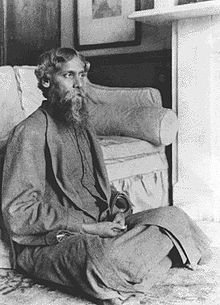|
Song Offerings
 Song Offerings (Bengali: গীতাঞ্জলি) is a volume of lyrics by Bengali poet Rabindranath Tagore, rendered into English by the poet himself, for which he was awarded the 1913 Nobel Prize in Literature.[1] ContentsSong Offerings is often identified as the English rendering of Gitanjali (Bengali: গীতাঞ্জলি), a volume of poetry by poet Rabindranath Tagore composed between 1904 and 1910 and published in 1910. However, in fact, Song Offerings anthologizes also English translation of poems from his drama Achalayatan and nine other previously published volumes of Tagore poetry.[2] The ten works, and the number of poems selected from each, are as follows:[3]
Song Offerings is a collection of devotional songs to the supreme. The deep-rooted spiritual essence of the volume is brought out from the following extract :
(Poem 28, Song Offering) The word gitanjali is composed from "geet", song, and "anjali", offering, and thus means – "An offering of songs"; but the word for offering, anjali, has a strong devotional connotation, so the title may also be interpreted as "prayer offering of song".[4] Nature of translationRabindranath Tagore took the liberty of doing "free translation" while rendering these 103 poems into English. Consequently, in many cases these are transcreations rather than translation; however, literary biographer Edward Thomson found them 'perfect' and 'enjoyable'. A reader can himself realize the approach taken by Rabindranath in translating his own poem with that translated by a professional translator. First is quoted lyric no. 1 of Song Offering as translated by Rabindranath himself :
It is the Lyric number 1 of Gitanjali. There is another English rendering of the same poem by Joe Winter translated in 1997:[5] Tagore undertook the translations prior to a visit to England in 1912, where the poems were extremely well received. In 1913, Tagore became the first non-European to win the Nobel Prize for Literature, largely for the English Gitanjali.[6] PublicationsThe first edition of Song Offerings was published in 1912 from London by the India Society. It was priced ten and a half shillings. The second edition was published by The Macmillan Company in 1913 and was priced at four and a half shillings. Introduction by Yeats An introduction by poet W. B. Yeats was added to the second edition of Song Offerings. Yeats wrote that this volume had "stirred my blood as nothing has for years. . . ." He candidly informed the readers, "I have carried the manuscript of these translations about with me for days, reading it in railway trains, or on the top of omnibuses and in restaurants, and I have often had to close it lest some stranger would see how much it moved me. These lyrics--which are in the original, my Indians tell me, full of subtlety of rhythm, of untranslatable delicacies of colour, of metrical invention—display in their thought a world I have dreamed of all my live long." Then, after describing the Indian culture which considered an important facilitating factor behind the sublime poetry of Rabindranath, Yeats stated, "The work of a supreme culture, they yet appear as much the growth of the common soil as the grass and the rushes. A tradition, where poetry and religion are the same thing, has passed through the centuries, gathering from learned and unlearned metaphor and emotion, and carried back again to the multitude the thought of the scholar and of the noble."[8][9] Nobel Prize in 1913In 1913, Rabindranath Tagore was awarded the Nobel Prize for literature. Evaluation of Tagore as a great poet was based mainly on the evaluation of Song Offerings, in addition to the recommendations that put his name on the short list. In awarding the prize to Rabindranth, the Nobel committee stated: "because of his profoundly sensitive, fresh and beautiful verse, by which, with consummate skill, he has made his poetic thought, expressed in his own English words, a part of the literature of the West"[10] The Nobel committee recognized him as "an author who, in conformity with the express wording of Alfred Nobel's last will and testament, had during the current year, written the finest poems «of an idealistic tendency."[11] The Nobel Committee finally quoted from Song Offering and stated that Rabindranath in thought-impelling pictures, has shown how all things temporal are swallowed up in the eternal:
In response to the announcement of the Nobel prize, Rabindranath sent a telegram saying, "I beg to convey to the Swedish Academy my grateful appreciation of the breadth of understanding which has brought the distant near, and has made a stranger a brother." This was read out by Mr. Clive, the-then British Chargé d'Affaires (CDA) in Sweden, at the Nobel Banquet at Grand Hôtel, Stockholm, on 10 December 1913.[12] Eight years after the Nobel Prize was awarded, Rabindranath went to Sweden in 1921 to give his acceptance speech. Comments on Song OfferingsThe first formal review of Song Offerings was in the Times Literary Supplement on its 7 November issue of 1912 (p. 492).[3] References
External linksWikimedia Commons has media related to Gitanjali. Wikisource has original text related to this article:
|
||||||||||||||||||||||||
Portal di Ensiklopedia Dunia
